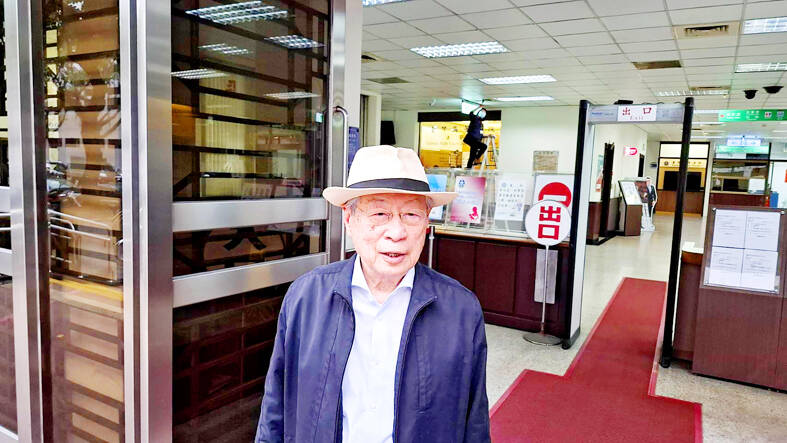Cheng Tzu-tsai (鄭自才), a former dissident who conspired to assassinate then-vice premier Chiang Ching-kuo (蔣經國) in the US in 1970, appeared in court on Tuesday last week seeking compensation for a one-year prison term he served in Taiwan on separate charges more than 30 years ago.
Cheng was imprisoned in November 1992 for illegally entering Taiwan the previous year, but his conviction was overturned in September last year by the Ministry of Justice.
The ministry approved Cheng’s application under the Act on Promoting Transitional Justice (促進轉型正義條例), legislation which aims to address injustices committed during the period of Chinese Nationalist Party (KMT) authoritarian rule in Taiwan from 1945 to 1992.

Photo: Yang Kuo-wen, Taipei Times
Speaking outside the High Court on Tuesday last week, Cheng said he is seeking the maximum compensation of NT$5,000 (US$152) per day calculated for every day of his 365-day sentence, a total of NT$1.825 million.
High Court judge Liu Wei-pi (劉為丕) said that the ministry’s decision to revoke Cheng’s conviction was based on transitional justice legislation, but whether this ruling is relevant to the Criminal Compensation Act (刑事補償法) has yet to be established by the court.
The case at the High Court continues.
Cheng alongside his brother-in-law and coconspirator Peter Huang (黃文雄) took part in a failed attempt to assassinate Chiang, who was visiting New York in April 20, 1970, to meet with then-US president Richard Nixon.
The pair later insisted they were motivated by political reasons to kill Chiang, the son of then-president Chiang Kai-shek (蔣中正), who later replaced his father as president under the authoritarian KMT-led regime in 1978.
At the time, Cheng was secretary-general of the World United Formosans for Independence, an alliance of overseas Taiwanese promoting the establishment of a Republic of Taiwan.
Cheng was immediately arrested after the unsuccessful assassination attempt, but jumped bail in the US and later lived outside Taiwan for more than two decades.
He was arrested in January 1991 and imprisoned under the National Security Act (國家安全法) for illegally entering the country.
Now 89 years old, Cheng is chairman of the Sovereign State for Formosa and Pescadores Party, a small pro-Taiwanese independence political party established in 2019.

Taiwan’s Liu Ming-i, right, who also goes by the name Ray Liu, poses with a Chinese Taipei flag after winning the gold medal in the men’s physique 170cm competition at the International Fitness and Bodybuilding Federation Asian Championship in Ajman, United Arab Emirates, yesterday.

Costa Rica sent a group of intelligence officials to Taiwan for a short-term training program, the first time the Central American country has done so since the countries ended official diplomatic relations in 2007, a Costa Rican media outlet reported last week. Five officials from the Costa Rican Directorate of Intelligence and Security last month spent 23 days in Taipei undergoing a series of training sessions focused on national security, La Nacion reported on Friday, quoting unnamed sources. The Costa Rican government has not confirmed the report. The Chinese embassy in Costa Rica protested the news, saying in a statement issued the same

A year-long renovation of Taipei’s Bangka Park (艋舺公園) began yesterday, as city workers fenced off the site and cleared out belongings left by homeless residents who had been living there. Despite protests from displaced residents, a city official defended the government’s relocation efforts, saying transitional housing has been offered. The renovation of the park in Taipei’s Wanhua District (萬華), near Longshan Temple (龍山寺), began at 9am yesterday, as about 20 homeless people packed their belongings and left after being asked to move by city personnel. Among them was a 90-year-old woman surnamed Wang (王), who last week said that she had no plans

TO BE APPEALED: The environment ministry said coal reduction goals had to be reached within two months, which was against the principle of legitimate expectation The Taipei High Administrative Court on Thursday ruled in favor of the Taichung Environmental Protection Bureau in its administrative litigation against the Ministry of Environment for the rescission of a NT$18 million fine (US$609,570) imposed by the bureau on the Taichung Power Plant in 2019 for alleged excess coal power generation. The bureau in November 2019 revised what it said was a “slip of the pen” in the text of the operating permit granted to the plant — which is run by Taiwan Power Co (Taipower) — in October 2017. The permit originally read: “reduce coal use by 40 percent from Jan.